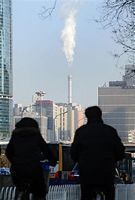 I make my second foray into the climate debate with trepidation. But visiting Denmark a few days before COP 15, it is impossible to escape the subject. Whether I speak to friends, family or strangers on the bus, everyone has a view and wants to share it. TV coverage of the forthcoming climate talks is relentless and there is even a separate passport queue for COP participants at Copenhagen’s stylish airport.
I make my second foray into the climate debate with trepidation. But visiting Denmark a few days before COP 15, it is impossible to escape the subject. Whether I speak to friends, family or strangers on the bus, everyone has a view and wants to share it. TV coverage of the forthcoming climate talks is relentless and there is even a separate passport queue for COP participants at Copenhagen’s stylish airport.
The latest “story” to emerge has pitted the new Climate Change Minister, the former commentator Lykke Friis against the Speaker of Parliament, Thor Pedersen. Though they are both from the same centre-right/liberal party, Mr. Pedersen has made himself the bogeyman de jour by saying that it is “a very dangerous to claim” that man-made CO2 emissions are the only cause of climate change. Cue howls of outrage and demands that the Prime Minister tell his colleague off.
What to make of it all as a layman who has spent most of his professional life in places where other things are more likely to kill you than melting icebergs? I am beginning to draw a number of tentative conclusions:
1. Climate change is happening. It has always happened. But we still do not know how big a role mankind has played. So far, it seems that a majority of scientists believe our role is quite big, but a number of prominent dissidents, like Henrik Svensmark, disagree. Being a scientific ignoramus, I hold with the majority, but remain open-minded.
2. We are, however, busy destroying our environment, whatever role that may play in changing the climate. We ship goods from afar, allow our kids to become distanced from their natural habitat (making them more at home with videogames, rather than nature) and have for many years ignored the economy’s environmental negatives. Our economic model is great; that’s why others want it. But if everyone lives like us, then the environment will invariably suffer.
3. Climate-focused adjustments will be very expensive, potentially of limited use and thus depriving other causes of funds (pace Bjorn Lomborg). Therefore, we need to weigh costs, effect and impact on such things as individual liberty – any such debate is absent.
4. If we do not act and it turns out to be true, we are stuffed. If we act, and it turns out to be false, we are poor. If we act and it turns out to be true, but our action is not enough, we are poor and stuffed. In this context, I lean towards acting, but others won’t.
Having come this far, what should I think we should do? I am sceptical that international powwows will accomplish much. Instead, I think any changes will have to come from re-modelling our products, habits and so on. That means clamping down on unnecessarily polluting cars, supporting insulation of homes, building more nuclear power plants etc. We already ensure that white goods (fridges, washing machines, etc.) pollute as little as possible. As a friend of mine notes, such products are placed into bands from A to G depending on how efficient they are. But why not do the same with other products – and even ban anything that is below band C?
Before deciding all this, though, we probably need to be less hysterical, more open to different views, accept that the science is compelling, but not overwhelming, and discuss the tradeoffs (rather than pretending that they don’t exist or deny any other options than one). That is not a very compelling protest slogan. But it is probably closer to where most people are on the subject than either diehard climate-deniers or environmental fanatics.






Comments